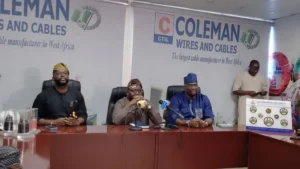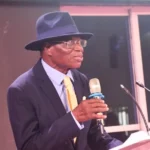
By Rukayat Moisemhe
The Minister of Power, Adedayo Adelabu, says the ministry is working on new local content legislation aimed at supporting indigenous manufacturers within the power sector ecosystem.
Adelabu made this known during a facility tour of Coleman Wires and Cables on Friday in Arepo area, Ogun.
He said the tour was for the Federal Government to better understand the capacities of stakeholders across the power value chain and support the patronage and sustainability of the sector.
The minister stated the government’s readiness to improve and develop local content manufacturing to drive import substitution, make them champions and engender global competitiveness.
“It is important to commend the resilience and capabilities of manufacturers in the country.
“The magnitude of import dependence is huge and those that have supported government’s efforts at import substitution must be acknowledged.
“Government’s ultimate target is 100 per cent import substitution to drive productive manufacturing, reduce pressure on foreign exchange and make Naira stronger.
“What coleman is doing is in line with the objectives of the Federal Government on manufacturing and ending the importation cycle and we are ready to support such activities,” he said.
In his remarks, Managing Director, Coleman Wires and Cables, Mr George Onafowokan, said that with the right support and incentives for local content utilisation, Nigeria would be well positioned as a processing country, creating more jobs and being sustainable.
Onafowokan noted that the company had proven that Made in Nigerian goods and services could cater to local and export needs and match up to international standards and global competition.
Coleman Technical Industries Ltd., manufacturers of Coleman Wires and Cables, largest cable company in sub-Saharan Africa.
He, however, stressed the need for the federal government to localise solutions to power transmission by developing the capacities of indigenous manufacturers and creating a more enabling incentivised business environment.
“In the drive for solutions to power transmission in the country, there must be a move that is seen from a local perspective, deliberately pushing for local industries to grow.
“Nigeria can be a processing country with the volumes of population we have, but it is important to have that much needed balance between fiscal and monetary policies to address foreign exchange volatility and create an enabling environment.
“Enablers for transition to a processing country must allow import of raw materials easily and export of finished products easily and focus on value addition for every sector to grow.
“We must also push domestic direct investment, incentivise them and address counterfeiting to drive Nigeria’s non-oil exports.
“At Coleman, we are working with the Standards Organisation of Nigeria (SON) to drive the identification process on each product to address counterfeiting,” he said.
To address the skill gaps observed in technical manufacturing, Onafowokan called for a review of the tertiary institution curriculum to accommodate intense practicality on automation and machinery engineering to enhance production.
Edited by Olawunmi Ashafa











